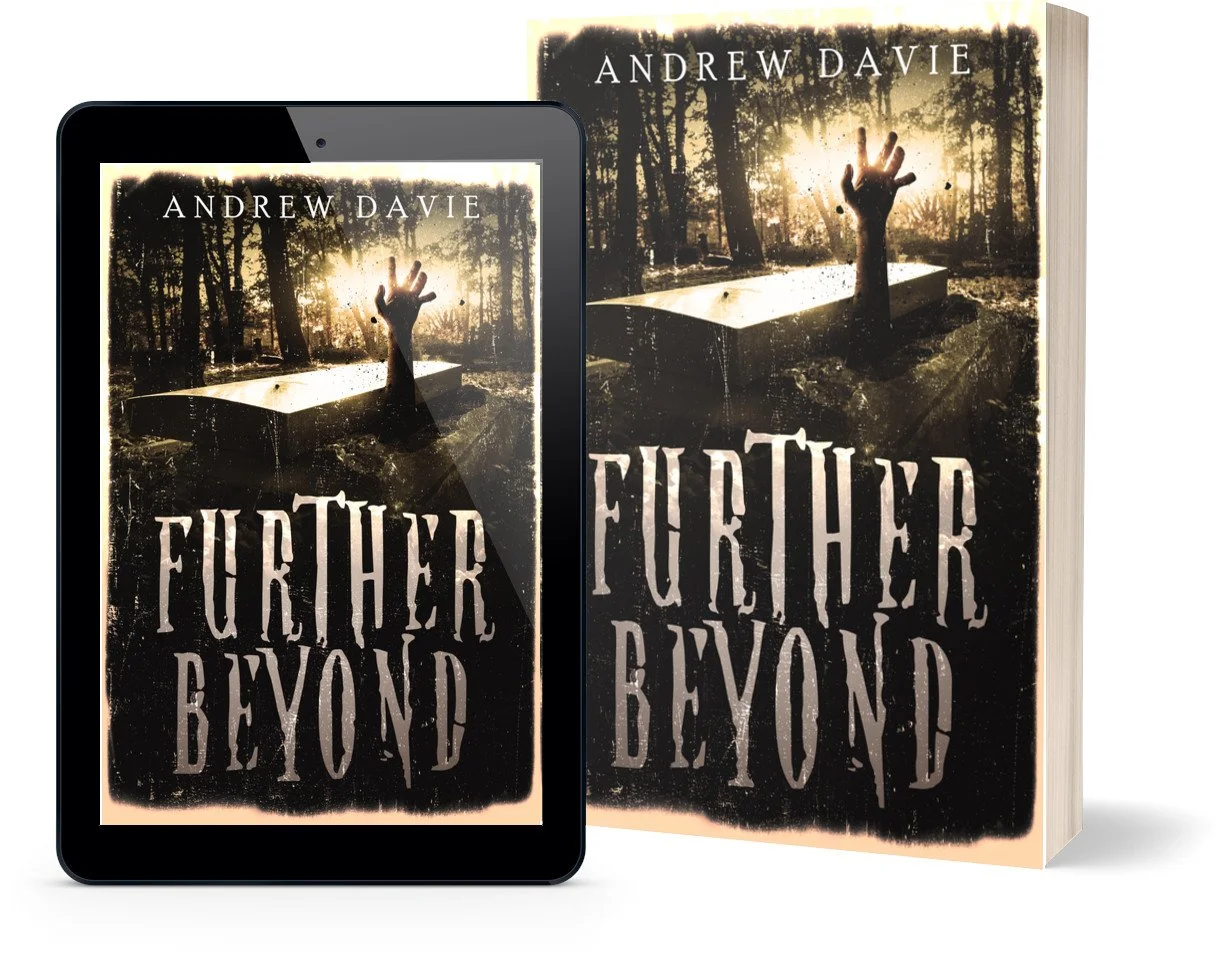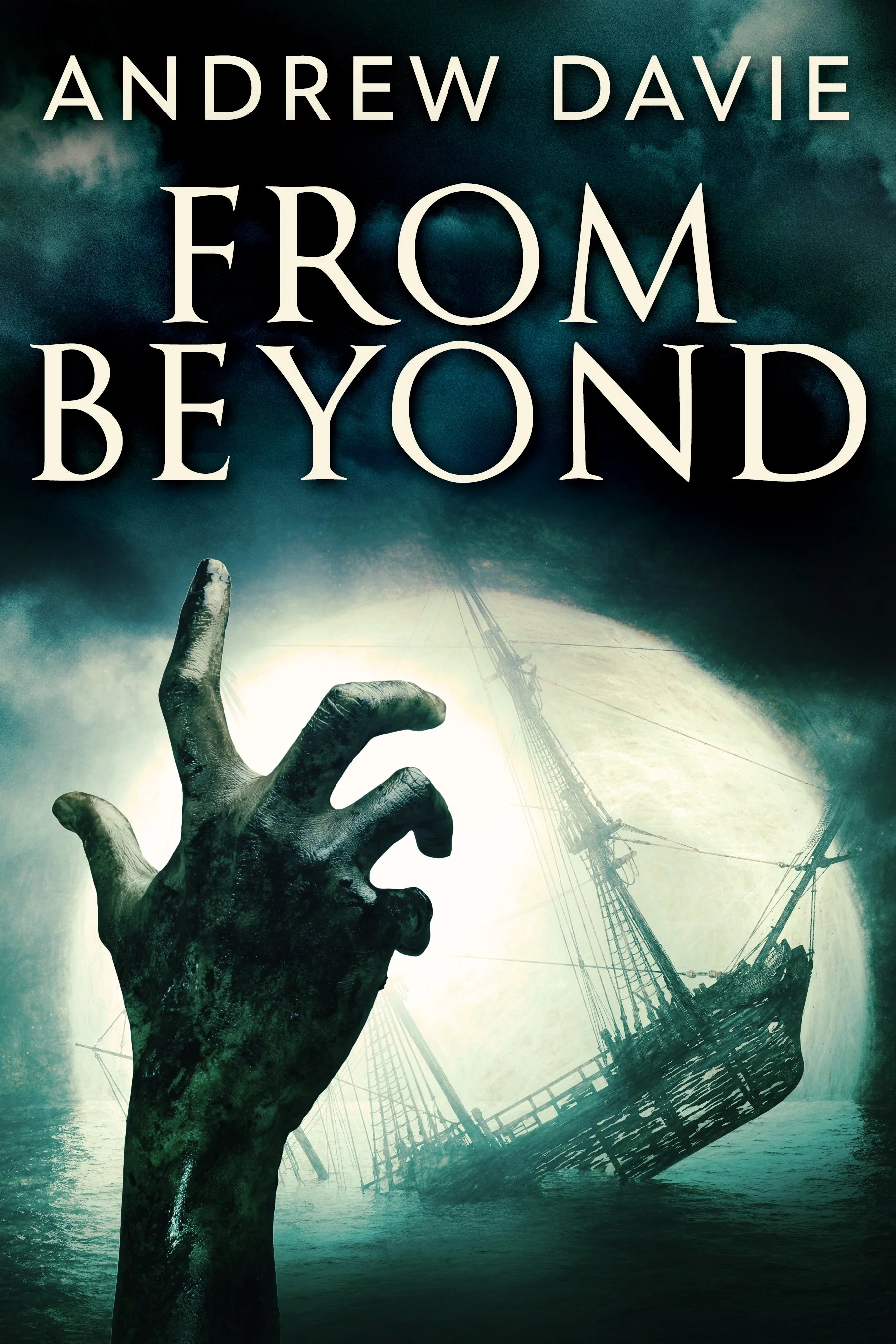Further Beyond - Andrew Davie
Further Beyond by Andrew Davie
Book excerpt
Georgetown, NY, 1899
O’Hanlon cut the twine on the parcel and placed the knife back on the desk. He was care-ful with the contents. There was no reason to doubt the journal’s authenticity, so he was holding a relic that had probably been bound almost nineteen hundred years ago.
He took a sip of tea, adjusted the cushion on his seat, and ran his fingers through his beard. As a younger man, his hair was red, and he could battle hordes with ease. Now, his beard was snow white and he was lucky to be able to stand up without feeling pain reverberate through his limbs: a combination of age and the effects of battle.
He drank some more tea and laughed aloud.
During his time as a mariner, he would have been drinking something much stronger. How things had changed. In fact, O’Hanlon had lost count of the number of times he had gone through this ritual, always in the anticipation of reading something which might alleviate his bur-den.
Subconsciously, he glanced to his left at the bookcase that housed diaries similar to the one he now held in his hand. Books that had claimed to reveal the secret behind the reanimation of the dead. None of them provided satisfactory answers. They were legitimate, but O’Hanlon didn’t care about their intrinsic value. Since he had given up his captaincy of The Tiamat, he only cared about discovering the answer to the reanimation of the dead. Over the last twelve years he referred to his encounter with them simply as “the Event.”
There was a knock at the door.
“Yes,” O’Hanlon said.
Sarah Louise entered, holding a kettle. Isolde and Ilon, Neapolitan Mastiffs, and Ruby and Coconut, Rat Terriers, were dutifully by her side. Sarah Louise poured tea into O’Hanlon’s empty cup. Neapolitans were enormous lumbering creatures who had a gentle disposition. While only a tiny fraction of their size, the terriers mimicked everything their giant counterparts did. It never ceased to make O’Hanlon laugh. The Mastiffs were great at guarding the property, and the terriers kept it virtually rodent-free. Although the terriers probably thought they were guarding the property too.
“Anything?” she said and jutted her chin toward the diary on his desk.
“I haven’t begun reading,” he replied.
Sarah Louise nodded. She was a compact woman just a shade over five feet tall, but she was incredibly strong. O’Hanlon had once seen her crush an apple with her bare hands. She had been the caretaker of his estate for a little over two years now since he had begun to have diffi-culty handling the daily chores himself. She had sharp, distinct features, had been permanently tanned by the sun, and kept her hair in braids that hung down either side of her neck.
“Thank you,” O’Hanlon said and took a sip of his tea.
“You’re welcome.”
She touched his shoulder. O’Hanlon put his hand over hers, but it was a gesture of appre-ciation more than anything else. At one time, there might have been the opportunity for romance, but neither wished to pursue it at this time. They didn’t speak for another moment. This was an-other part of the ritual while O’Hanlon was at his desk.
After she had taken him his tea, and before she fed the dogs, Sarah Louise would walk the grounds one final time before calling it an evening, returning to her room, and smoking a pipe. There wasn’t a need to walk the grounds since the dogs would have alerted them of any intruders, and the dogs hadn’t been vocal. O’Hanlon glanced down at them. While the mastiffs were certainly large, their non-threatening appearance was made even more so by the way their skin folds made them look gentle. However, once he had watched the Mastiffs destroy a scare-crow, literally ripping it to shreds, O’Hanlon had changed his perception of the animals.
“I pity the person who’s unwelcome here,” O’Hanlon would say.
Sarah Louise would wait to be dismissed for the evening, but O’Hanlon could tell she was getting antsy. She loved to walk the perimeter. O’Hanlon had never asked the details about her past. He knew she’d spent time with the Apaches, but he never questioned her about it. He figured if she wanted to divulge anything, she would. She had probably spent much of her time on guard duty, and old habits die hard. He told her she could retire for the evening. She bid him good night, and she and the dogs departed. Now alone again, O’Hanlon felt the desire overtake him, and he picked up the book but saw the letter he’d received the previous day from his sister, Poppy, and decided to reread it before he went to the diary.
More than a decade ago, O’Hanlon had been part of a crew who’d fled Hong Kong after maiming a local triad leader. O’Hanlon had suggested the crew visit O’Hanlon’s sister who lived in Colorado in the Americas and would be able to provide them with temporary sanctuary. O’Hanlon and his comrades, Grid and Malcolm, had only recently arrived at his sister’s orchard farm and met her other guests Ridley and Dranoff when The Event began. Members of a reli-gious order descended on his sister’s orchard and attacked.
Only slightly dismayed at first, O’Hanlon and the rest of them grew increasingly scared when they realized the interlopers were comprised of the undead. The group fled to the barn where they were able to hold off the first few waves of attack. O’Hanlon’s former captain, Mal-colm, sacrificed himself, so the rest of them could escape. Each of them would go their separate ways after the melee.
Grid returned to Asia, O’Hanlon became the captain of his own vessel, and Poppy would marry Ray Ridley. She and Ridley had stayed out west, though, they would not return to her or-chard farm. Poppy had confided in O’Hanlon that she would be haunted by too many memories had they stayed. Together, she and Ridley moved to California and found another orchard for her to oversee.
O’Hanlon finished reading the letter, placed it in a pile with the others, and picked up the journal. He hesitated for a moment. Long ago, he had committed himself to a life of searching for the cause of The Event. He’d reasoned he would not be at peace without answers, and he would be willing to sacrifice his own happiness. Occasionally, he would contemplate the various people he had forsaken, and the experiences he would never have. It was rare he would give those moments any indulgence, but lately, the desire to give up on his quest had become stronger. He sipped his tea.
“Vita incerta, mors certissima,” O’Hanlon said aloud.
A Latin proverb, “life is uncertain, death is most certain.”
He opened the book and began translating the journal of Felix Longinus.
















Praesent id libero id metus varius consectetur ac eget diam. Nulla felis nunc, consequat laoreet lacus id.